An Analysis of Ethics and Sustainability in Modern Business Practices
VerifiedAdded on 2021/06/15
|6
|1814
|41
Essay
AI Summary
This essay delves into the critical concepts of ethics and sustainability within a business context, emphasizing the evolution of Corporate Social Responsibility (CSR) beyond mere philanthropy to encompass legal, environmental, and ethical obligations. It examines the significance of CSR, stakeholder theory, and the triple bottom line as essential frameworks for organizational success in a competitive global market. The essay explores key trends in corporate ethics, such as the adoption of codes of ethics, character training, and the impact of technology, alongside sustainability trends like automation and transparency. It analyzes CSR from a stakeholder perspective, highlighting the importance of considering the impact of business operations on customers, employees, and the broader community. Furthermore, the essay discusses the influence of foreign social norms and standards on international business, including communication and cultural considerations, and contrasts legal versus ethical compliance in CSR. Finally, it examines the relationship between ethical branding and corporate reputation, emphasizing the role of branding in building social and economic value and the importance of maintaining a positive corporate image through ethical practices.
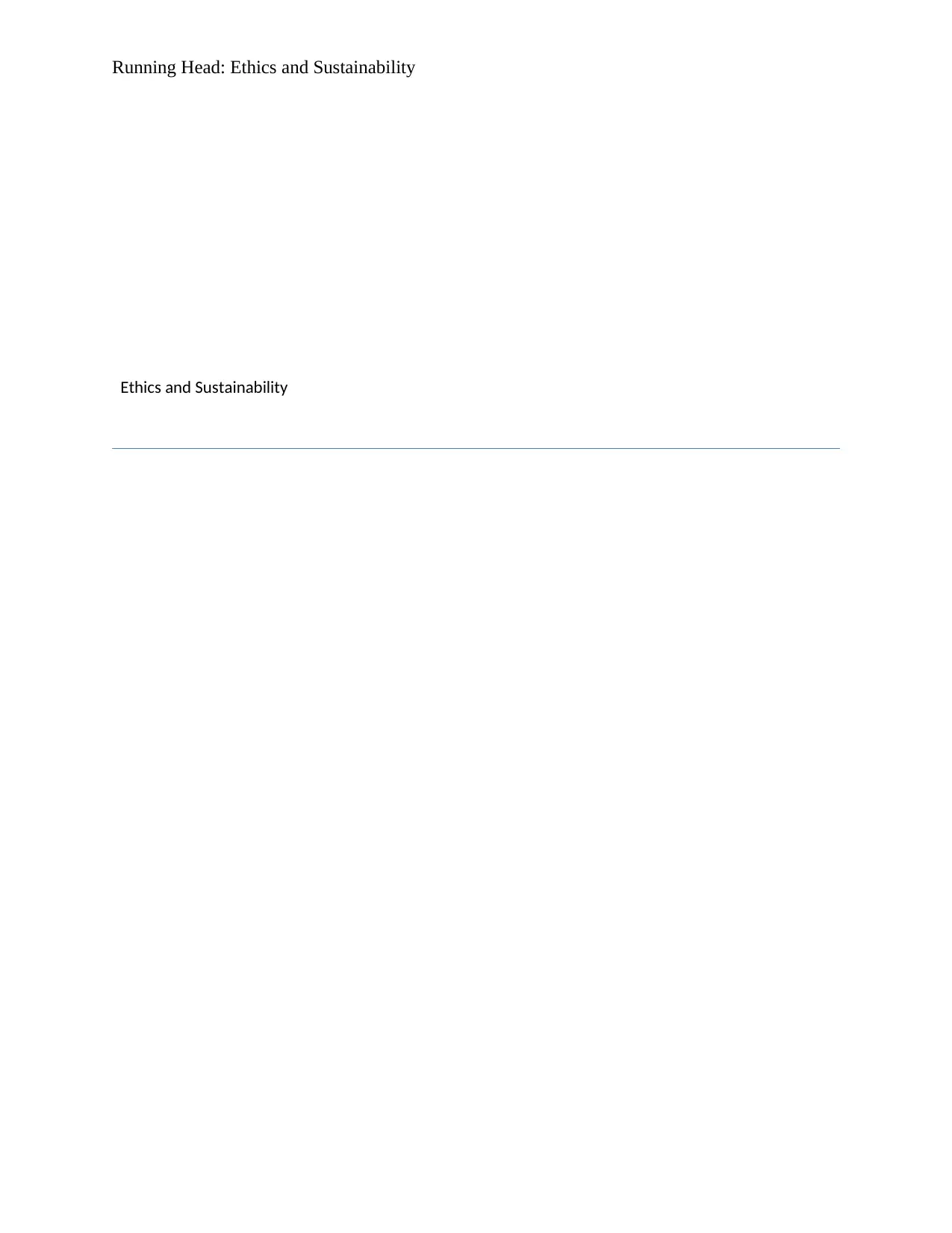
Running Head: Ethics and Sustainability
Ethics and Sustainability
Ethics and Sustainability
Paraphrase This Document
Need a fresh take? Get an instant paraphrase of this document with our AI Paraphraser
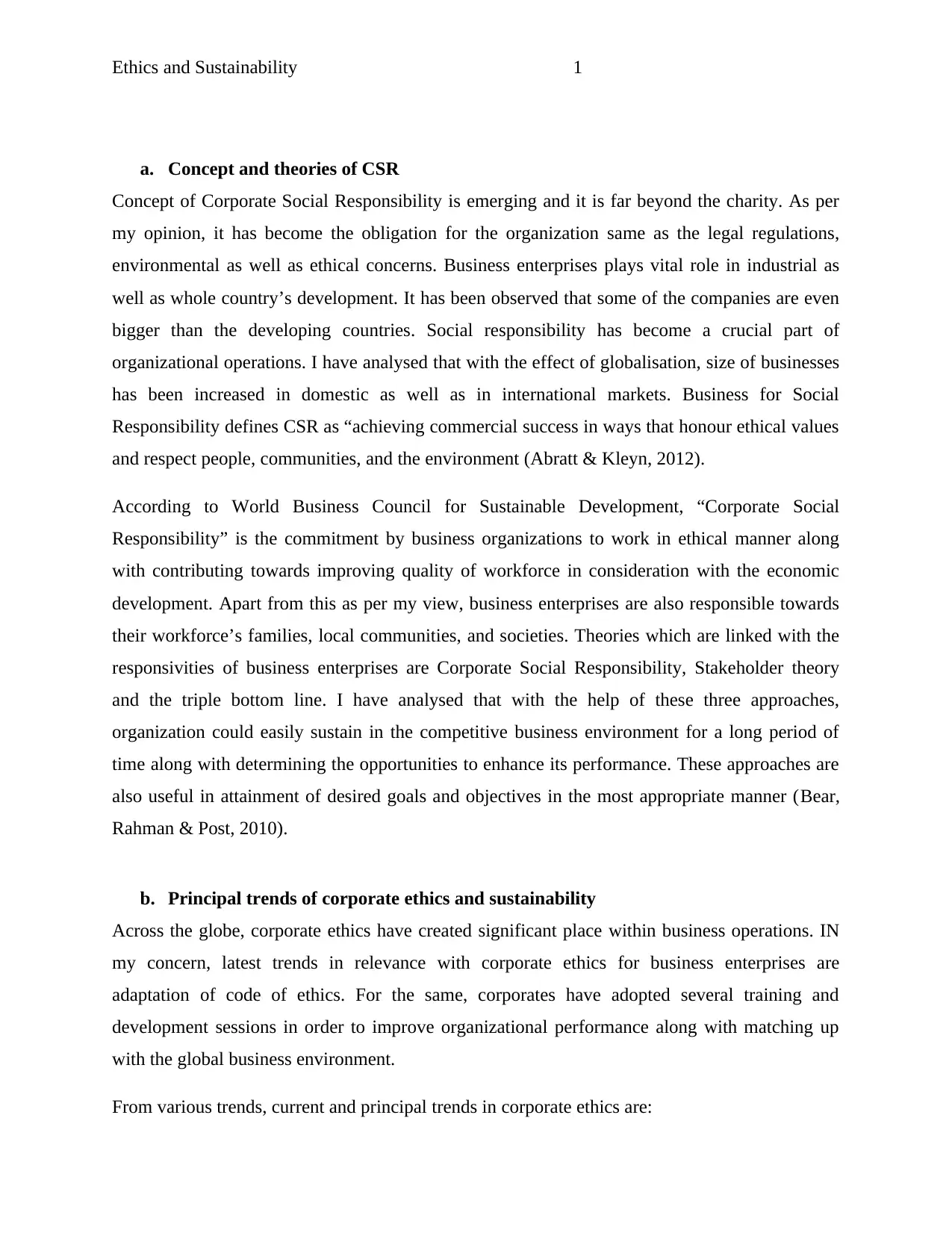
Ethics and Sustainability 1
a. Concept and theories of CSR
Concept of Corporate Social Responsibility is emerging and it is far beyond the charity. As per
my opinion, it has become the obligation for the organization same as the legal regulations,
environmental as well as ethical concerns. Business enterprises plays vital role in industrial as
well as whole country’s development. It has been observed that some of the companies are even
bigger than the developing countries. Social responsibility has become a crucial part of
organizational operations. I have analysed that with the effect of globalisation, size of businesses
has been increased in domestic as well as in international markets. Business for Social
Responsibility defines CSR as “achieving commercial success in ways that honour ethical values
and respect people, communities, and the environment (Abratt & Kleyn, 2012).
According to World Business Council for Sustainable Development, “Corporate Social
Responsibility” is the commitment by business organizations to work in ethical manner along
with contributing towards improving quality of workforce in consideration with the economic
development. Apart from this as per my view, business enterprises are also responsible towards
their workforce’s families, local communities, and societies. Theories which are linked with the
responsivities of business enterprises are Corporate Social Responsibility, Stakeholder theory
and the triple bottom line. I have analysed that with the help of these three approaches,
organization could easily sustain in the competitive business environment for a long period of
time along with determining the opportunities to enhance its performance. These approaches are
also useful in attainment of desired goals and objectives in the most appropriate manner (Bear,
Rahman & Post, 2010).
b. Principal trends of corporate ethics and sustainability
Across the globe, corporate ethics have created significant place within business operations. IN
my concern, latest trends in relevance with corporate ethics for business enterprises are
adaptation of code of ethics. For the same, corporates have adopted several training and
development sessions in order to improve organizational performance along with matching up
with the global business environment.
From various trends, current and principal trends in corporate ethics are:
a. Concept and theories of CSR
Concept of Corporate Social Responsibility is emerging and it is far beyond the charity. As per
my opinion, it has become the obligation for the organization same as the legal regulations,
environmental as well as ethical concerns. Business enterprises plays vital role in industrial as
well as whole country’s development. It has been observed that some of the companies are even
bigger than the developing countries. Social responsibility has become a crucial part of
organizational operations. I have analysed that with the effect of globalisation, size of businesses
has been increased in domestic as well as in international markets. Business for Social
Responsibility defines CSR as “achieving commercial success in ways that honour ethical values
and respect people, communities, and the environment (Abratt & Kleyn, 2012).
According to World Business Council for Sustainable Development, “Corporate Social
Responsibility” is the commitment by business organizations to work in ethical manner along
with contributing towards improving quality of workforce in consideration with the economic
development. Apart from this as per my view, business enterprises are also responsible towards
their workforce’s families, local communities, and societies. Theories which are linked with the
responsivities of business enterprises are Corporate Social Responsibility, Stakeholder theory
and the triple bottom line. I have analysed that with the help of these three approaches,
organization could easily sustain in the competitive business environment for a long period of
time along with determining the opportunities to enhance its performance. These approaches are
also useful in attainment of desired goals and objectives in the most appropriate manner (Bear,
Rahman & Post, 2010).
b. Principal trends of corporate ethics and sustainability
Across the globe, corporate ethics have created significant place within business operations. IN
my concern, latest trends in relevance with corporate ethics for business enterprises are
adaptation of code of ethics. For the same, corporates have adopted several training and
development sessions in order to improve organizational performance along with matching up
with the global business environment.
From various trends, current and principal trends in corporate ethics are:
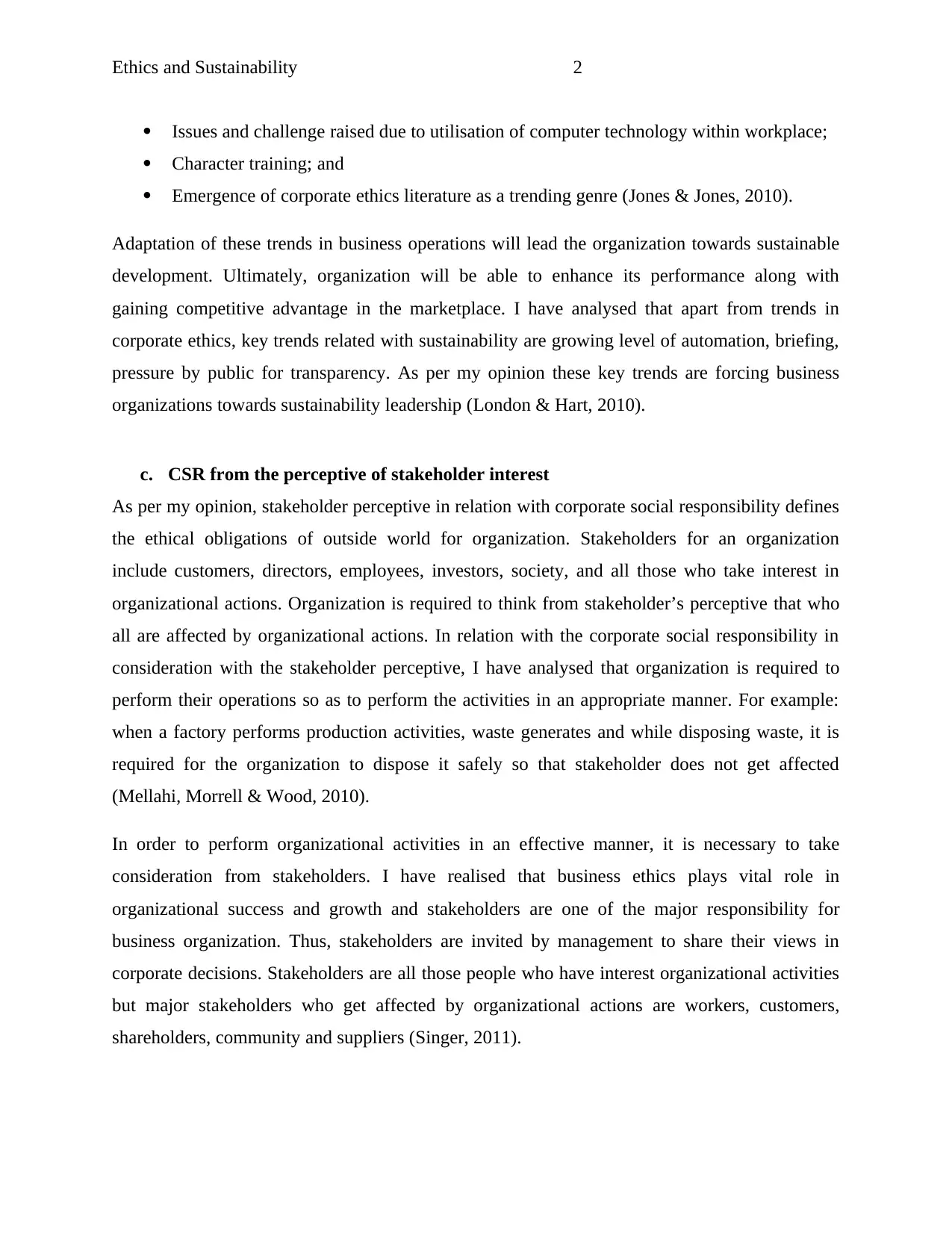
Ethics and Sustainability 2
Issues and challenge raised due to utilisation of computer technology within workplace;
Character training; and
Emergence of corporate ethics literature as a trending genre (Jones & Jones, 2010).
Adaptation of these trends in business operations will lead the organization towards sustainable
development. Ultimately, organization will be able to enhance its performance along with
gaining competitive advantage in the marketplace. I have analysed that apart from trends in
corporate ethics, key trends related with sustainability are growing level of automation, briefing,
pressure by public for transparency. As per my opinion these key trends are forcing business
organizations towards sustainability leadership (London & Hart, 2010).
c. CSR from the perceptive of stakeholder interest
As per my opinion, stakeholder perceptive in relation with corporate social responsibility defines
the ethical obligations of outside world for organization. Stakeholders for an organization
include customers, directors, employees, investors, society, and all those who take interest in
organizational actions. Organization is required to think from stakeholder’s perceptive that who
all are affected by organizational actions. In relation with the corporate social responsibility in
consideration with the stakeholder perceptive, I have analysed that organization is required to
perform their operations so as to perform the activities in an appropriate manner. For example:
when a factory performs production activities, waste generates and while disposing waste, it is
required for the organization to dispose it safely so that stakeholder does not get affected
(Mellahi, Morrell & Wood, 2010).
In order to perform organizational activities in an effective manner, it is necessary to take
consideration from stakeholders. I have realised that business ethics plays vital role in
organizational success and growth and stakeholders are one of the major responsibility for
business organization. Thus, stakeholders are invited by management to share their views in
corporate decisions. Stakeholders are all those people who have interest organizational activities
but major stakeholders who get affected by organizational actions are workers, customers,
shareholders, community and suppliers (Singer, 2011).
Issues and challenge raised due to utilisation of computer technology within workplace;
Character training; and
Emergence of corporate ethics literature as a trending genre (Jones & Jones, 2010).
Adaptation of these trends in business operations will lead the organization towards sustainable
development. Ultimately, organization will be able to enhance its performance along with
gaining competitive advantage in the marketplace. I have analysed that apart from trends in
corporate ethics, key trends related with sustainability are growing level of automation, briefing,
pressure by public for transparency. As per my opinion these key trends are forcing business
organizations towards sustainability leadership (London & Hart, 2010).
c. CSR from the perceptive of stakeholder interest
As per my opinion, stakeholder perceptive in relation with corporate social responsibility defines
the ethical obligations of outside world for organization. Stakeholders for an organization
include customers, directors, employees, investors, society, and all those who take interest in
organizational actions. Organization is required to think from stakeholder’s perceptive that who
all are affected by organizational actions. In relation with the corporate social responsibility in
consideration with the stakeholder perceptive, I have analysed that organization is required to
perform their operations so as to perform the activities in an appropriate manner. For example:
when a factory performs production activities, waste generates and while disposing waste, it is
required for the organization to dispose it safely so that stakeholder does not get affected
(Mellahi, Morrell & Wood, 2010).
In order to perform organizational activities in an effective manner, it is necessary to take
consideration from stakeholders. I have realised that business ethics plays vital role in
organizational success and growth and stakeholders are one of the major responsibility for
business organization. Thus, stakeholders are invited by management to share their views in
corporate decisions. Stakeholders are all those people who have interest organizational activities
but major stakeholders who get affected by organizational actions are workers, customers,
shareholders, community and suppliers (Singer, 2011).
⊘ This is a preview!⊘
Do you want full access?
Subscribe today to unlock all pages.

Trusted by 1+ million students worldwide
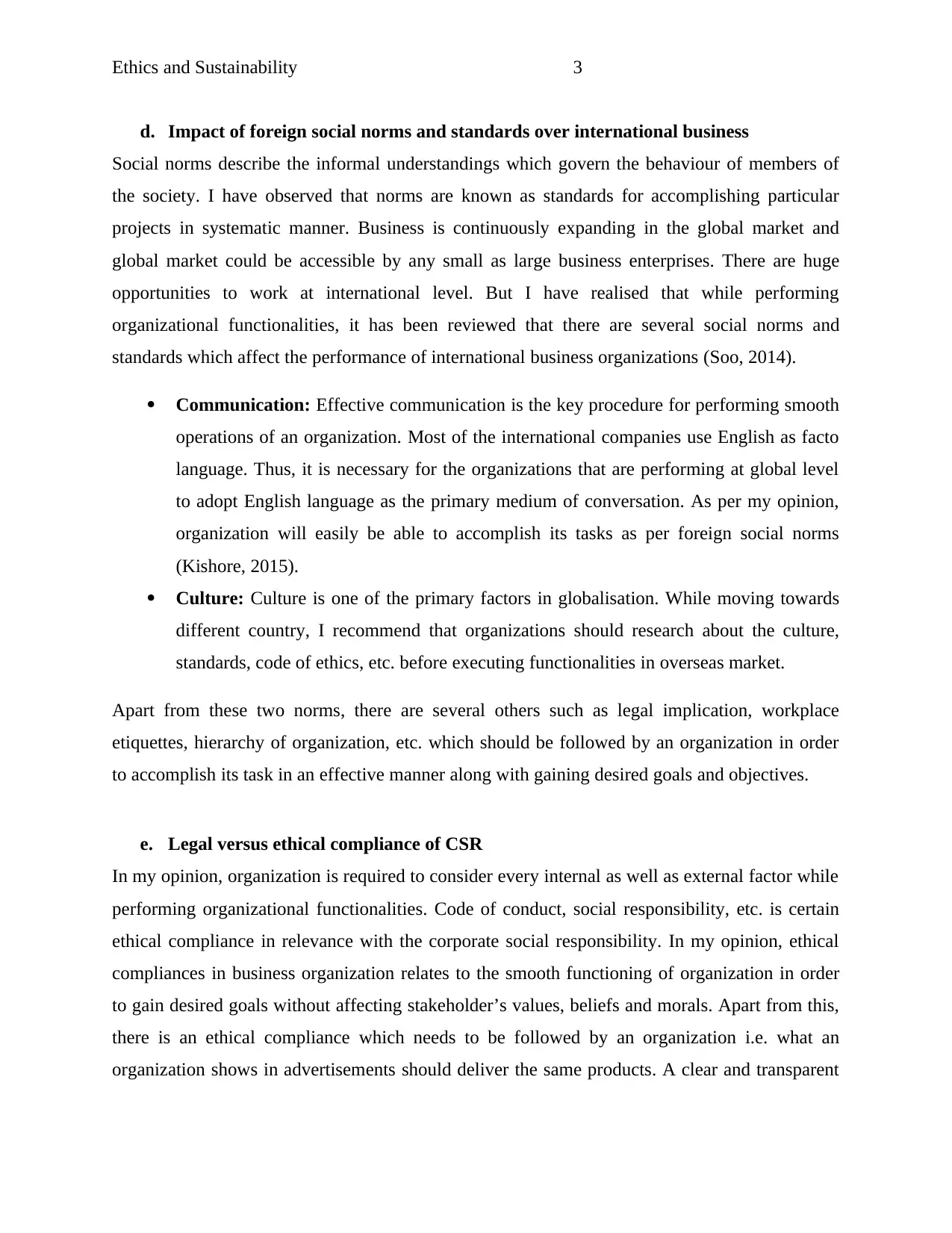
Ethics and Sustainability 3
d. Impact of foreign social norms and standards over international business
Social norms describe the informal understandings which govern the behaviour of members of
the society. I have observed that norms are known as standards for accomplishing particular
projects in systematic manner. Business is continuously expanding in the global market and
global market could be accessible by any small as large business enterprises. There are huge
opportunities to work at international level. But I have realised that while performing
organizational functionalities, it has been reviewed that there are several social norms and
standards which affect the performance of international business organizations (Soo, 2014).
Communication: Effective communication is the key procedure for performing smooth
operations of an organization. Most of the international companies use English as facto
language. Thus, it is necessary for the organizations that are performing at global level
to adopt English language as the primary medium of conversation. As per my opinion,
organization will easily be able to accomplish its tasks as per foreign social norms
(Kishore, 2015).
Culture: Culture is one of the primary factors in globalisation. While moving towards
different country, I recommend that organizations should research about the culture,
standards, code of ethics, etc. before executing functionalities in overseas market.
Apart from these two norms, there are several others such as legal implication, workplace
etiquettes, hierarchy of organization, etc. which should be followed by an organization in order
to accomplish its task in an effective manner along with gaining desired goals and objectives.
e. Legal versus ethical compliance of CSR
In my opinion, organization is required to consider every internal as well as external factor while
performing organizational functionalities. Code of conduct, social responsibility, etc. is certain
ethical compliance in relevance with the corporate social responsibility. In my opinion, ethical
compliances in business organization relates to the smooth functioning of organization in order
to gain desired goals without affecting stakeholder’s values, beliefs and morals. Apart from this,
there is an ethical compliance which needs to be followed by an organization i.e. what an
organization shows in advertisements should deliver the same products. A clear and transparent
d. Impact of foreign social norms and standards over international business
Social norms describe the informal understandings which govern the behaviour of members of
the society. I have observed that norms are known as standards for accomplishing particular
projects in systematic manner. Business is continuously expanding in the global market and
global market could be accessible by any small as large business enterprises. There are huge
opportunities to work at international level. But I have realised that while performing
organizational functionalities, it has been reviewed that there are several social norms and
standards which affect the performance of international business organizations (Soo, 2014).
Communication: Effective communication is the key procedure for performing smooth
operations of an organization. Most of the international companies use English as facto
language. Thus, it is necessary for the organizations that are performing at global level
to adopt English language as the primary medium of conversation. As per my opinion,
organization will easily be able to accomplish its tasks as per foreign social norms
(Kishore, 2015).
Culture: Culture is one of the primary factors in globalisation. While moving towards
different country, I recommend that organizations should research about the culture,
standards, code of ethics, etc. before executing functionalities in overseas market.
Apart from these two norms, there are several others such as legal implication, workplace
etiquettes, hierarchy of organization, etc. which should be followed by an organization in order
to accomplish its task in an effective manner along with gaining desired goals and objectives.
e. Legal versus ethical compliance of CSR
In my opinion, organization is required to consider every internal as well as external factor while
performing organizational functionalities. Code of conduct, social responsibility, etc. is certain
ethical compliance in relevance with the corporate social responsibility. In my opinion, ethical
compliances in business organization relates to the smooth functioning of organization in order
to gain desired goals without affecting stakeholder’s values, beliefs and morals. Apart from this,
there is an ethical compliance which needs to be followed by an organization i.e. what an
organization shows in advertisements should deliver the same products. A clear and transparent
Paraphrase This Document
Need a fresh take? Get an instant paraphrase of this document with our AI Paraphraser
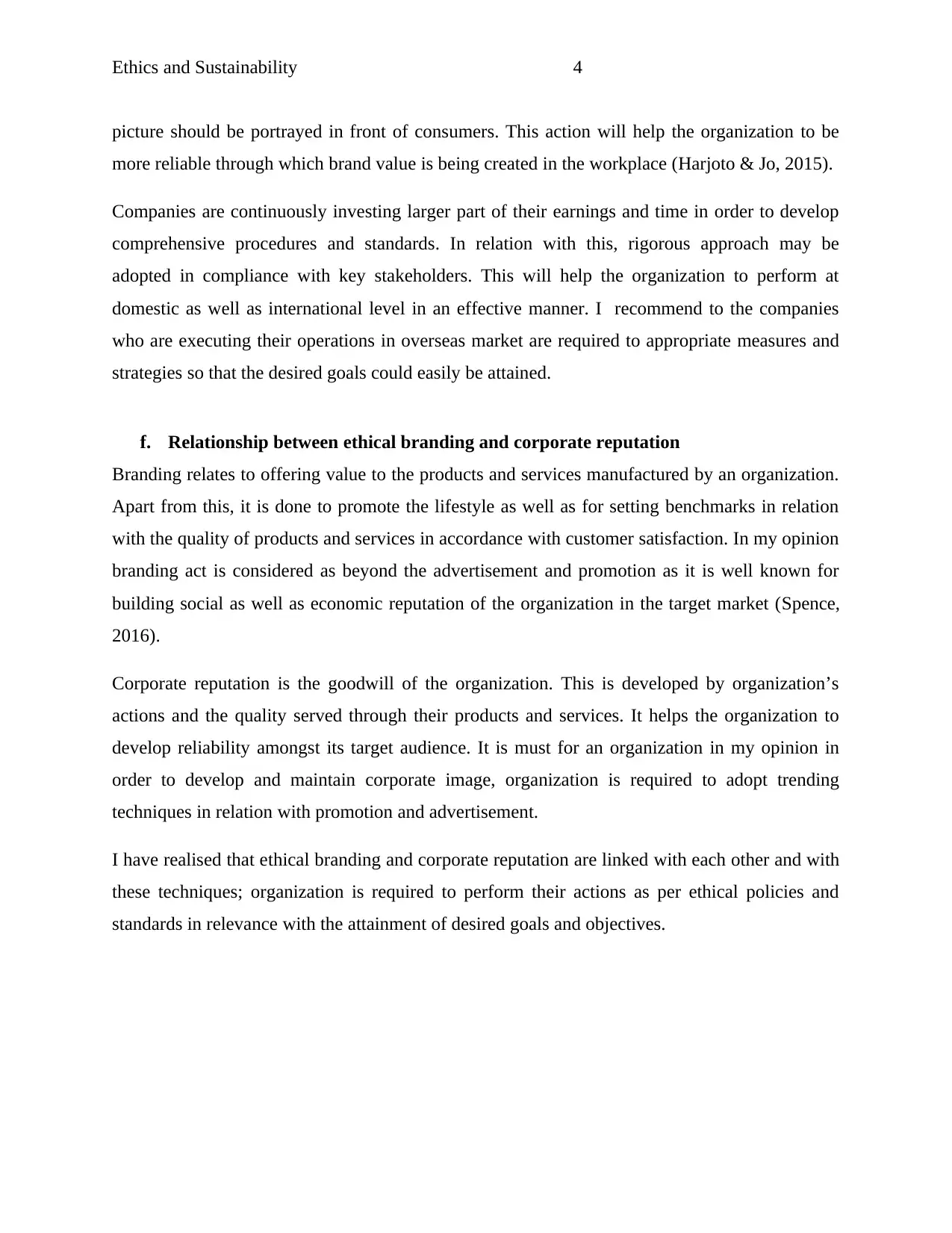
Ethics and Sustainability 4
picture should be portrayed in front of consumers. This action will help the organization to be
more reliable through which brand value is being created in the workplace (Harjoto & Jo, 2015).
Companies are continuously investing larger part of their earnings and time in order to develop
comprehensive procedures and standards. In relation with this, rigorous approach may be
adopted in compliance with key stakeholders. This will help the organization to perform at
domestic as well as international level in an effective manner. I recommend to the companies
who are executing their operations in overseas market are required to appropriate measures and
strategies so that the desired goals could easily be attained.
f. Relationship between ethical branding and corporate reputation
Branding relates to offering value to the products and services manufactured by an organization.
Apart from this, it is done to promote the lifestyle as well as for setting benchmarks in relation
with the quality of products and services in accordance with customer satisfaction. In my opinion
branding act is considered as beyond the advertisement and promotion as it is well known for
building social as well as economic reputation of the organization in the target market (Spence,
2016).
Corporate reputation is the goodwill of the organization. This is developed by organization’s
actions and the quality served through their products and services. It helps the organization to
develop reliability amongst its target audience. It is must for an organization in my opinion in
order to develop and maintain corporate image, organization is required to adopt trending
techniques in relation with promotion and advertisement.
I have realised that ethical branding and corporate reputation are linked with each other and with
these techniques; organization is required to perform their actions as per ethical policies and
standards in relevance with the attainment of desired goals and objectives.
picture should be portrayed in front of consumers. This action will help the organization to be
more reliable through which brand value is being created in the workplace (Harjoto & Jo, 2015).
Companies are continuously investing larger part of their earnings and time in order to develop
comprehensive procedures and standards. In relation with this, rigorous approach may be
adopted in compliance with key stakeholders. This will help the organization to perform at
domestic as well as international level in an effective manner. I recommend to the companies
who are executing their operations in overseas market are required to appropriate measures and
strategies so that the desired goals could easily be attained.
f. Relationship between ethical branding and corporate reputation
Branding relates to offering value to the products and services manufactured by an organization.
Apart from this, it is done to promote the lifestyle as well as for setting benchmarks in relation
with the quality of products and services in accordance with customer satisfaction. In my opinion
branding act is considered as beyond the advertisement and promotion as it is well known for
building social as well as economic reputation of the organization in the target market (Spence,
2016).
Corporate reputation is the goodwill of the organization. This is developed by organization’s
actions and the quality served through their products and services. It helps the organization to
develop reliability amongst its target audience. It is must for an organization in my opinion in
order to develop and maintain corporate image, organization is required to adopt trending
techniques in relation with promotion and advertisement.
I have realised that ethical branding and corporate reputation are linked with each other and with
these techniques; organization is required to perform their actions as per ethical policies and
standards in relevance with the attainment of desired goals and objectives.
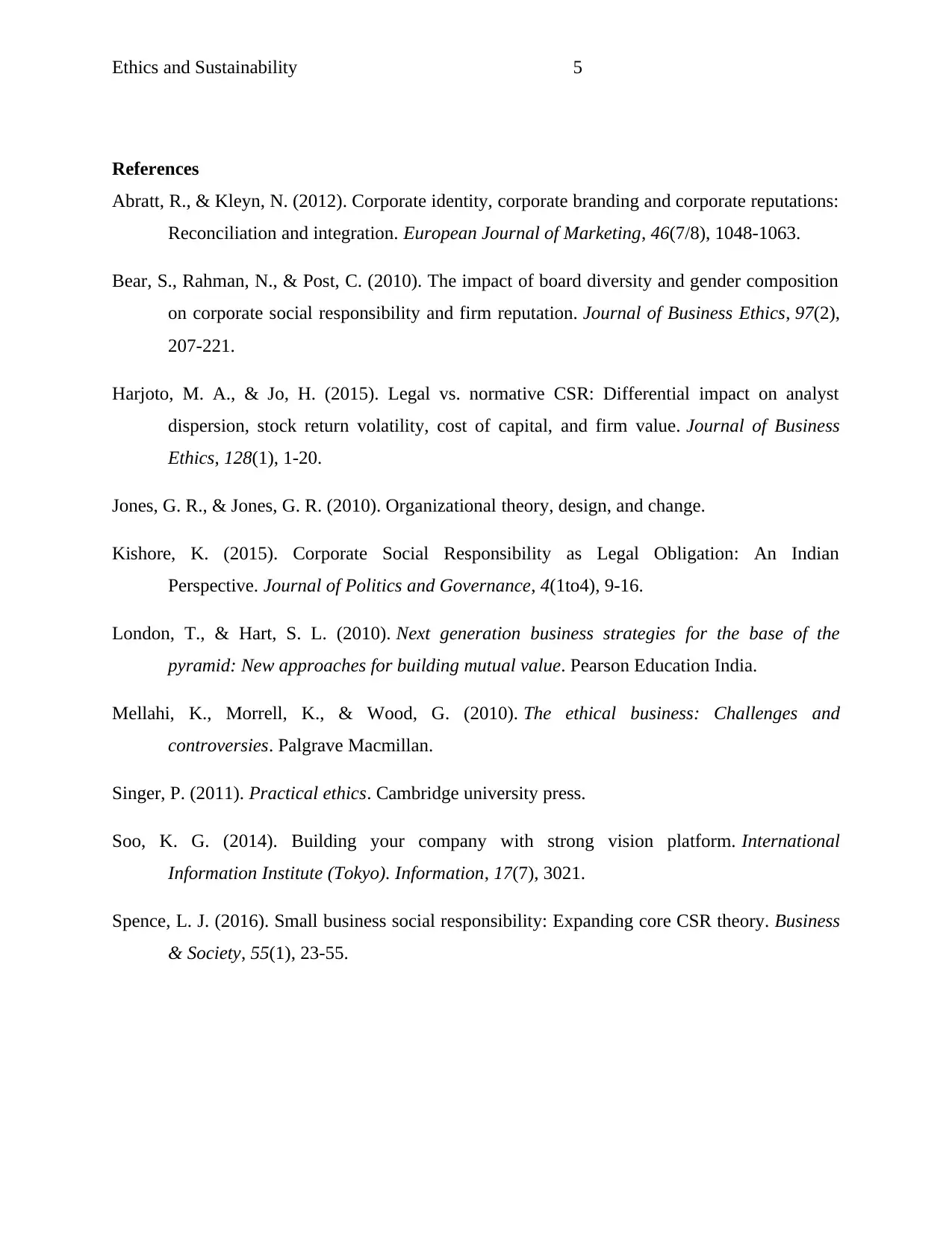
Ethics and Sustainability 5
References
Abratt, R., & Kleyn, N. (2012). Corporate identity, corporate branding and corporate reputations:
Reconciliation and integration. European Journal of Marketing, 46(7/8), 1048-1063.
Bear, S., Rahman, N., & Post, C. (2010). The impact of board diversity and gender composition
on corporate social responsibility and firm reputation. Journal of Business Ethics, 97(2),
207-221.
Harjoto, M. A., & Jo, H. (2015). Legal vs. normative CSR: Differential impact on analyst
dispersion, stock return volatility, cost of capital, and firm value. Journal of Business
Ethics, 128(1), 1-20.
Jones, G. R., & Jones, G. R. (2010). Organizational theory, design, and change.
Kishore, K. (2015). Corporate Social Responsibility as Legal Obligation: An Indian
Perspective. Journal of Politics and Governance, 4(1to4), 9-16.
London, T., & Hart, S. L. (2010). Next generation business strategies for the base of the
pyramid: New approaches for building mutual value. Pearson Education India.
Mellahi, K., Morrell, K., & Wood, G. (2010). The ethical business: Challenges and
controversies. Palgrave Macmillan.
Singer, P. (2011). Practical ethics. Cambridge university press.
Soo, K. G. (2014). Building your company with strong vision platform. International
Information Institute (Tokyo). Information, 17(7), 3021.
Spence, L. J. (2016). Small business social responsibility: Expanding core CSR theory. Business
& Society, 55(1), 23-55.
References
Abratt, R., & Kleyn, N. (2012). Corporate identity, corporate branding and corporate reputations:
Reconciliation and integration. European Journal of Marketing, 46(7/8), 1048-1063.
Bear, S., Rahman, N., & Post, C. (2010). The impact of board diversity and gender composition
on corporate social responsibility and firm reputation. Journal of Business Ethics, 97(2),
207-221.
Harjoto, M. A., & Jo, H. (2015). Legal vs. normative CSR: Differential impact on analyst
dispersion, stock return volatility, cost of capital, and firm value. Journal of Business
Ethics, 128(1), 1-20.
Jones, G. R., & Jones, G. R. (2010). Organizational theory, design, and change.
Kishore, K. (2015). Corporate Social Responsibility as Legal Obligation: An Indian
Perspective. Journal of Politics and Governance, 4(1to4), 9-16.
London, T., & Hart, S. L. (2010). Next generation business strategies for the base of the
pyramid: New approaches for building mutual value. Pearson Education India.
Mellahi, K., Morrell, K., & Wood, G. (2010). The ethical business: Challenges and
controversies. Palgrave Macmillan.
Singer, P. (2011). Practical ethics. Cambridge university press.
Soo, K. G. (2014). Building your company with strong vision platform. International
Information Institute (Tokyo). Information, 17(7), 3021.
Spence, L. J. (2016). Small business social responsibility: Expanding core CSR theory. Business
& Society, 55(1), 23-55.
⊘ This is a preview!⊘
Do you want full access?
Subscribe today to unlock all pages.

Trusted by 1+ million students worldwide
1 out of 6
Related Documents
Your All-in-One AI-Powered Toolkit for Academic Success.
+13062052269
info@desklib.com
Available 24*7 on WhatsApp / Email
![[object Object]](/_next/static/media/star-bottom.7253800d.svg)
Unlock your academic potential
Copyright © 2020–2025 A2Z Services. All Rights Reserved. Developed and managed by ZUCOL.





